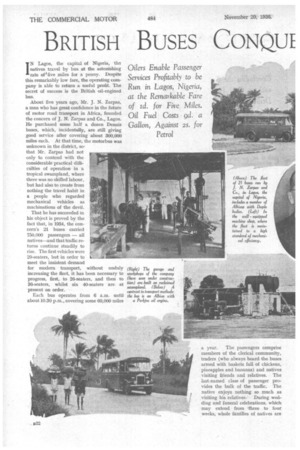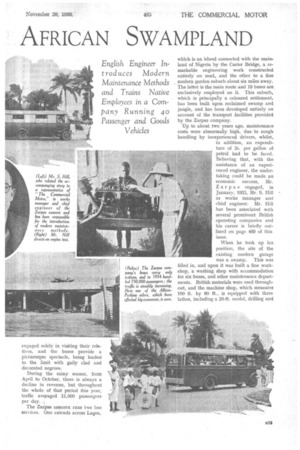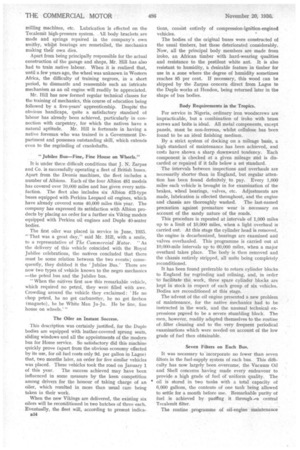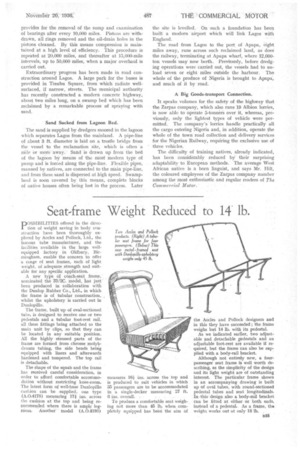BRITISH BUSES CONQUE AFRICAN SWAMPLAND
Page 46

Page 47

Page 48

Page 49

If you've noticed an error in this article please click here to report it so we can fix it.
Oilers Enable Passenger Services Profitably to be Run in Lagos, Nigeria, at the Remarkable Fare of id. for Five Miles. Oil Fuel Costs gd. a Gallon, Against 25. for Petrol
English Engineer Introduces Modern Maintenance Methods and Trains Native Employees in a Company Running 4c, Passenger and Goods
Vehicles
N Lagos, the capital ofNigeria, th s. e I.
. natives travel by bu at the astonishing rate of 'five miles for a penny. Despite this remarkably low fare, the operating company is able to return a useful profit. The secret of success is the British oil-engined has.
About five years ago, Mr. J. N. Zarpas, a man who has great confidence in the future of motor road transport in Africa, founded the concern of J. N. Zarpas and Co., Lagos. He purchased some half a dozen Dennis buses, which, incidentally, are still giving good service after covering about 300,000 miles each. At that time, the motorbus was unknown in the district, 80' that Mr. Zarpas had not only to contend with the considerable practical difficulties of operation in a tropical swampland, where there was no skilled labour, but had also to create from nothing the travel habit in a people who regarded mechanical vehicles as machinations of the devil.
That he has succeeded in his object is proved by the fact that, in 1034, the concern's 21 buses carried 750,000 passengers — all natives—and that traffic returns continue steadily to rise. The first vehicles were 20-seaters, but in order to I.— _ meet the insistent demand for modern transport, without unduly increasing the fleet, it has been necessary to progress, first, to 20-seaters, and thento 36-seaters, whilst six 40-seaters are at present on order.
Each bus operates from 6 a.m. until about 10.30 p.m., covering some 60,000 miles a year. The passengers comprise members of the clerical community, traders (who always board the buses armed with baskets full of chickens, pineapples and bananas) and natives visiting friends and relatives. The last-named class of passenger provides the bulk of the traffic. The native enjoys nothing so much as
visiting his relatives. During wedding and funeral celebrations, which may extend from three to four weeks, whole families of natives are
engaged solely in visaing their relatives, and the buses provide a picturesque spectacle, being loaded to the limit with gaily clad and decorated negroes.
During the rainy season, from April to October, there is always a decline in revenue, but throughout the whole of that period this year, traffic a.ve,raged 11,000 passengers per day.
The Zarpas concern runs two bus services. One extends across Lagos,
which is an. island connected with the mainland. of Nigeria by the Carter Bridge, a remarkable engineering work constructed entirely on mud, and the other to a fine modern garden suburb about six miles away. The latter is the main route and 19 buses are exclusively employed OR it. This suburb, which is principally a coloured settlement, has been built upon reclaimed swamp and jungle, and has been developed entirely on account of the transport facilities provided by the Zarpas company.
Up to about two years ago, maintenance costs were abnormally high, due to rough handling by inexperienced drivers, whilst, in addition, an expenditure of 2s. per gallon of petrol had to be faced. Believing that, with the assistance of an experienced engineer, the undertaking could be made an economic success, Mr. Zarpas engaged, in January, 1935, Mr. S. Hill as works manager and chief engineer. Mr. Hill bas been associated with several prominent British operating companies and his career is briefly outlined on page 469 of this issue.
When he took up his position, the site of the existing modern garage was a swamp. This was filled in, and upon it was built a fine workshop, a washing shop with accommodation for six buses, and other maintenance departments. British materials were used throughout, and the machine shop,, which measures 100 ft. by 80 ft., is equipped with three lathes, including a 2041. model, drilling and milling machines, etc. Lubrication is effected on the Tecalemit high-pressure system. kill body brackets are made and springs repaired in the company's own smithy, whilst bearings are remetalled, the mechanics making their own dies.
Apart from being principally responsible for the actual construction of the garage and shops, Mr. Hill has also had to train native labour. When it is realized that, until a few years ago, the wheel was unknown in Western Africa, the difficulty of training negroes, in a short period, to dismantle and reassemble such an intricate mechanism as an oil engine will readily be appreciated.
Mr. Hill has now formed regular technical classes for the training of mechanics, this course of education being followed by a five-years' apprenticeship. Despite' the obvious handicaps, quite a satisfactory standard of labour has already been achieved, particularly in connection with carpentry, for which the natives have a natural aptitude. Mr. Hill is fortunate in having a native foreman who was trained in a Government Department and possesses outstanding skill, which extends even to the regrinding of crankshafts.
"Jubilee Bus—Fine,Fine House on Wheels."
It is under the2e difficult conditions that J. N. Zarpas and Co. is successfully operating a fleet of British buses. Apart from the Dennis machines, the fleet includes a number of Albions. Each of the four Albion 481 models has covered over 70,000 miles and has given every satisfaction. The fleet also includes six Albion 473-type buses equipped with Perkins Leopard oil engines, which have already covered some 40,000 miles this year. The company has expressed its satisfaction with Albion products by placing an order for a further six Viking models equipped with Perkins oil engines and Duple 40-seater bodies.
The first oiler was placed in service in June, 1935. "That was a great day," said Mr. Hill, with a smile, to a representative of The Commercial Motor. "As the delivery of this vehicle coincided with the Royal Jubilee celebrations, the natives concluded that there must be some relation between the two events ; consequently, -they dubbed it the 'Jubilee Bus.' There are now two types of vehicle known to the negro mechanics —the petrol bus and the jubilee bus.
"When the natives first saw this remarkable vehicle, which required no petrol, they were filled with awe. Crowding around the vehicle they exclaimed: 'He no chop petrol, he no get carburetter, he no get firebox (magneto), he be White Man ju-Ju. He be fine, fine house on wheels.'" The Oiler an Instant Success.
This description was certainly justified, for the Duple bodies are equipped with leather-covered sprung seats, sliding windows and all the appointments of the modern bus for Home service. So satisfactory did this machine quickly prove (apart from the obvious economy effected by its use, for oil fuel costs only 9d. per gallon in Lagos) that, two months later, an order for five similar vehicles was placed. These vehicles took the road on January 1 of this year. The success achieved may have been influenced in some measure by the keen competition among drivers for the honour of taking charge of an oiler, which resulted in more than usual care being taken in their work.
When the new Vikings are delivered, the existing six oilers will be reconditioned in two batches of three each. Eventually, the fleet will, according to present indica 1334
tions, consist entirely of compression-ignition-engined vehicles.
The bodies of the original buses were constructed of the usual timbers, but these deteriorated considerably. Now, all the principal body members are made from iroko, an African timber with hard-wearing qualities and resistance to the pestilent white ant. It is also resistant to humidity, a desirable feature in timber for use in a zone where the degree of humidity sometimes reaches 85 per cent. If necessary, this wood can be shipped by the Zarpas concern direct from Lagos to the Duple works at Hendon, being returned later in the shape of bus bodies.
Body Requirements in the Tropics.
For service in Nigeria, ordinary iron woodscrews are impracticable, but a combination of iroko with brass screws and bolts is ideal. All metal components, except panels, must be non-ferrous, whilst cellulose has been found to be an ideal finishing medium.
By a strict system of docking on a mileage basis, a high standard of maintenance has been achieved, and costs have shown a sharp downward tendency. Each component is checked at a given mileage and is discarded or repaired if it falls below a set standard.
The intervals between inspections and overhauls are necessarily shorter than in England, but regular attention has been found definitely. to pay. Every 1,000 miles each vehicle is brought in for examination of the brakes, wheel bearings, valves, etc. Adjustments are made, lubrication is effected throughout, and the engine and chassis are thoroughly washed. The last-named precaution against premature wear is necessary on account of the sandy nature of the roads.
This procedure is repeated at intervals of 1,000 miles up to a limit of 10,000 miles, when a light overhaul is carried out. At this stage the cylinder head is removed, the engine is decarbonized, bearings are examined and valves overhauled. This programme is carried out at 10,000-mile intervals up to 60,000 miles, when a major overhaul takes place. The body is then removed and the chassis entirely stripped, all units being completely reconditioned.
It has been found preferable to return cylinder blocks to England for regrinding and relining, and, in order to facilitate the work, three spare cylinder blocks are kept in stock in respect of each group of six vehicles. Bodies are reconditioned at this stage.
The advent of the oil engine presented a new problem of maintenance, for the native Mechanics had to beinstructed in the work, and the unusual technical expressions proved to be a severe stumbling block. The men, however, readily adapted themselves to the routine of filter cleaning and to the very frequent periodical examinations which were needed on account of the low grade of fuel then obtainable.
Seven Filters on Each Bus.
It was necessary to incorporate no fewer than seven filters in the fuel-supply system of each bus. This difficulty has now largely been overcome, the Vacuum Oil and Shell concerns having made every endeavour to provide a high grade of fuel of uniform quality. The
• oil is stored in two tanks with a total capacity of 6,000 gallons, the contents of one tank being allowed to settle for a month before use. Remarkable purity of fuel is achieved by pas51ng it through central Tecalemit filter.
The routine programme of oil-engine maintenance
provides for the removal of tbe sump and examination of bearings after every 10,000 miles. Pistons are-withdralVn, all rings removed and the oil-drain holes in the pistons cleaned. By this means compression is maintained at a high level of efficiency. This procedure is repeated at 20,000 miles, and thereafter at 15,000-mile intervals, up to 50,000 miles, when?. major overhaul is carried out.
Extraordinary progress has been made in road construction around Lagos. A large park for the buses is provided in Tinubu Square, from which radiate wellsurfaced, if narrow, streets. The municipal authority has recently constructed a modern concrete highway, about two miles long, on a swamp bed which has been reclaimed by a remarkable process of spraying with sand.
Sand Sucked from Lagoon Bed.
The sand is supplied by dredgers moored in the lagoon which separates Lagos from the mainland. A pipe-line of about 3 ft. diameter is laid on a trestle bridge from the vessel to the reclamation site, which is often a Mile or more away-. Sand is drawn up from the bed of the lagoon by means of the most modern type of pump and is forced along the pipe-line. Flexible pipes, manned by natives, are connected to the main pipe-line, and from these sand is dispersed at high speed. Swampland is soon covered by this means, complete blocks of native houses often being lost in the process. Later
the site is levelled. On such a foundation has been built a modern airport which will link Lagos with England.
The road from Lagos to the port, of Apapa, eight miles away, runs across such reclaimed land, as does the railway, terminating at Apapa wharf, where 12,000ton vessels may now berth. Previously, before dredging operations were carried out, the vessels had to unload seven or eight miles outside the harbour. The whole of the produce of Nigeria is brought to Apapa, and much of it by road.
A Big Goods-transport Connection.
It speaks volumes for the safety of the highway that the Zarpas company, which also runs 19 Albion lorries, is now able to operate 5-tonners over it, whereas, previously, only the lightest types of vehicle were permitted. The company's lorries handle practically all the cargo entering Nigeria and, in addition, operate the whole of the town' road collection and delivery services for the Nigerian Railway, requiring the exclusive use of three vehicles.
The difficulty of training natives, already indicated, has been considerably reduced by their surprising adaptability to European methods. The average West African native is a born linguist, and says Mr. Hill, the coloured employees of the Zarpas company number among the most enthusiastic and regular readers of The Commercial Motor.




























































































